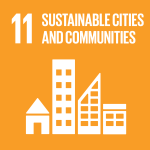
Tuvalu’s land reclamation in progress. Photo: UNDP
“We need not call for Sympathy, rather we call for Solutions! In hindsight, climate justice should be at the forefront of our efforts as we address the urgent need for mitigation, adaptation, and support for the most vulnerable nations.” - Prime Minister of Tuvalu, Honourable Mr. Kausea Natano, at the 78th Session of the United Nations General Assembly General Debate 22 September 22, 2023, New York
With only around 25 square kilometers of land in total across its nine atoll islands, much of the small Pacific Island country of Tuvalu is less than one meter above high spring tide levels. Due to sea-level rise, it was estimated that over half of Tuvalu’s capital would be flooded by tidal waters by 2050, putting the population and capital at risk.
But the people of Tuvalu and the Government, together with support from the UN Development Programme (UNDP), the Green Climate Fund, and the Government of Australia, have not been deterred in their mission to combat the rising sea. Under Tuvalu’s National Strategy for Sustainable Development 2021-2030, “Te Kete” resilience to climate change and disasters are a key priority in the vision for a peaceful, resilient, and prosperous nation.
The Tuvalu Coastal Adaptation Project (TCAP) is leading the country’s response to stay ahead of the curve on climate adaptation. Given that retreating to higher ground is not possible, new higher land that would remain above sea levels beyond 2100 was designed as a buffer, to ensure that large storms can be weathered and to secure communities for decades.
Now, construction of the multimillion-dollar coastal adaptation infrastructure project in the capital Funafuti is complete, with more areas set to follow soon. The reclamation incorporates drainage to protect from heavy rainfall and a small harbor facility to provide continued community access to the Funafuti Lagoon. Plans are underway to ensure the site is properly maintained, with the buried mega-bags expected to remain intact well beyond 40 years.
Moving pieces as construction work continues
Although the main reclamation civil works have been completed at Funafuti, that is not the end. For the next 12 months, TCAP will monitor the site to ensure that the site and foreshore engineering performs to specification. During this time, landscaping, involving planting thousands of native plants along the seaward margin will be undertaken, as well as any work necessary to maintain all aspects of the new development.
After the monitoring period, UNDP will then deliver the completed work site over to the Government of Tuvalu, who have in turn committed to hand the land over to the Funafuti Kaupule for management and development. The Kaupule have already started to think about the future use of the land, and efforts to prepare a Development Control Plan to guide the sustainable use of the land into the future are underway.
There are plans to raise awareness about how the land can be used before any building can commence, to protect the new land, its geotextile bunding, as well as the harbour. In the meantime, construction work will commence on Nanumaga Island.
Minister of Finance and National Designated Authority, and Chair of the TCAP Board Hon. Seve Paeniu, said: “TCAP is demonstrating that modern engineering and coastal management practices, coupled with community input to design, planning and implementation, can enable Tuvalu to meet climate change head on and for future generations to determine their own fate.”
Into the future, women and youth are receiving targeted training on coastal change and processes and will be coached in the advantages and differing approaches to coastal hazard management. These enhanced skills will contribute to the general empowerment of women and are directly linked to increasing employment opportunities and support for leadership and to increase decision-making in coastal management among women on the island.
Gender mainstreaming training models have also been developed by TCAP, tailored to the local context, and conducted with key government and civil society representatives, to ensure that no one is left behind.
About the Tuvalu Coastal Adaptation Project
With US$36 million financing from the Green Climate Fund and US$2.9 million co-financing from the Government of Tuvalu, the 7-year Tuvalu Coastal Adaptation Project is contributing to strengthening the resilience of one of the world’s most vulnerable countries to climate change and sea-level rise. Implemented by the UN Development Programme in partnership with the Government, the project is improving coastal protection in key locations on the islands of Funafuti, Nanumea and Nanumaga. While new measures will act as a buffer during storms, the project also strives to build the capacity of national and island governments and local communities in adapting to climate change in the longer term. Learn more at TCAP.tv Follow the project on Twitter @TCAP4Tuvalu or on Facebook
About the United Nations Development Programme
UNDP is the leading United Nations organisation fighting to end the injustice of poverty, inequality, and climate change. Working with our broad network of experts and partners in 170 countries, we help nations to build integrated, lasting solutions for people and planet. Learn more at undp.org
About the Pacific Community (SPC)
The Pacific Community (SPC) is the principal scientific and technical organisation in the Pacific region, proudly supporting development since 1947. It is an international development organisation owned and governed by 27 country and territory members.
SPC is a key project partner to TCAP, undertaking Environmental and Social Impact, Geotechnical, Sea Level Measurement and Wave Inundation Assessments in support of TCAP’s work programme. SPC will also deliver a hands-on training programme for Tuvalu government officers and other interested parties in 2023. Among various subjects the training will cover use and improvement of the hazards dashboard.
Additional photos from the Tuvalu Coastal Adaptation Project also available on Flickr. *Please credit as indicated


